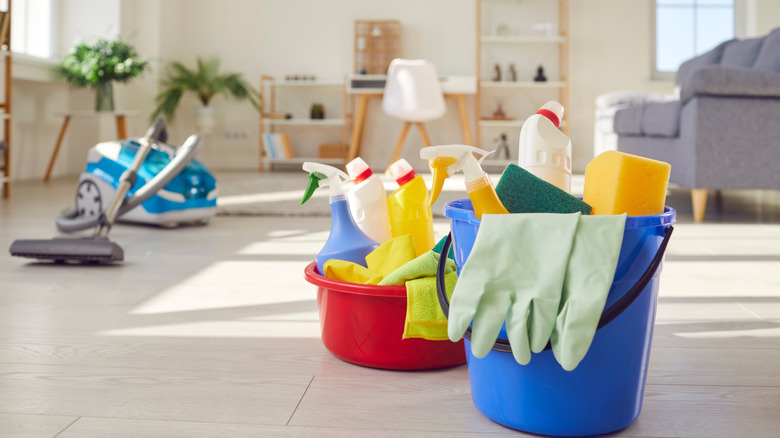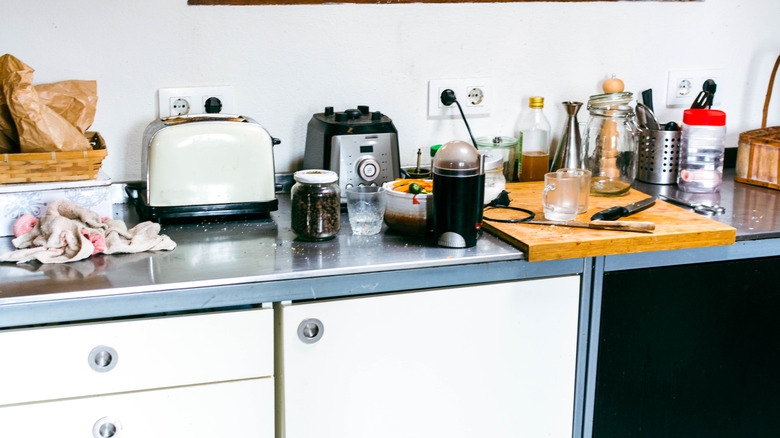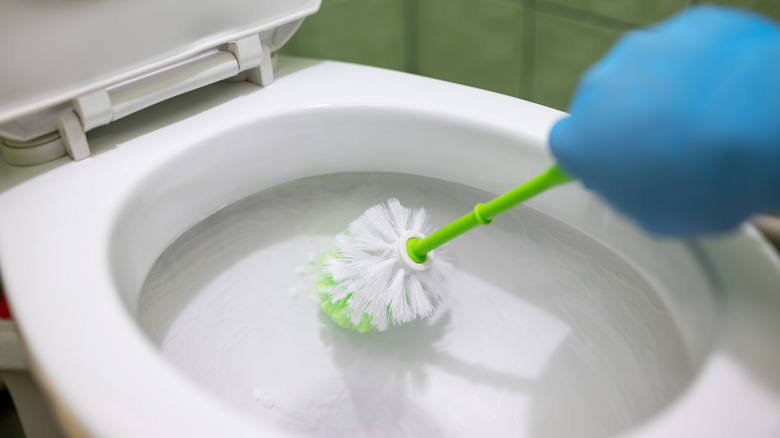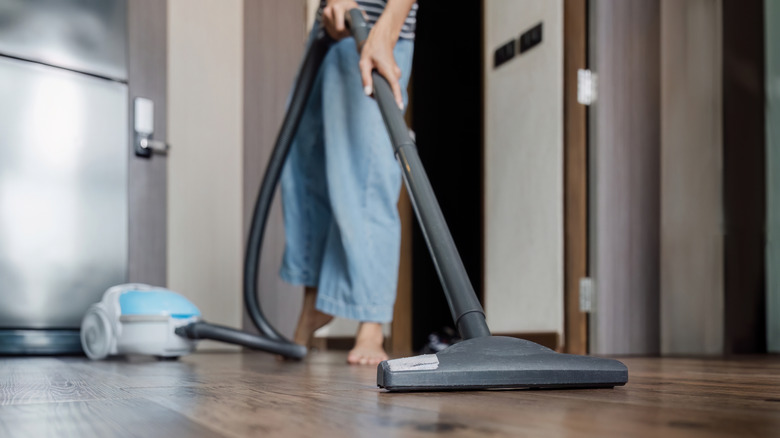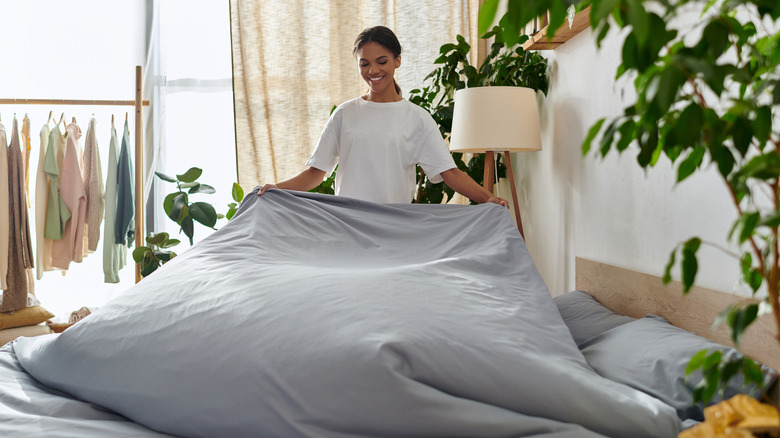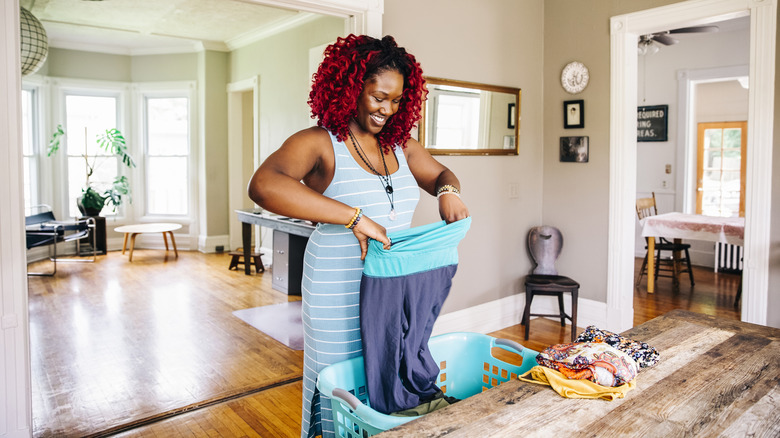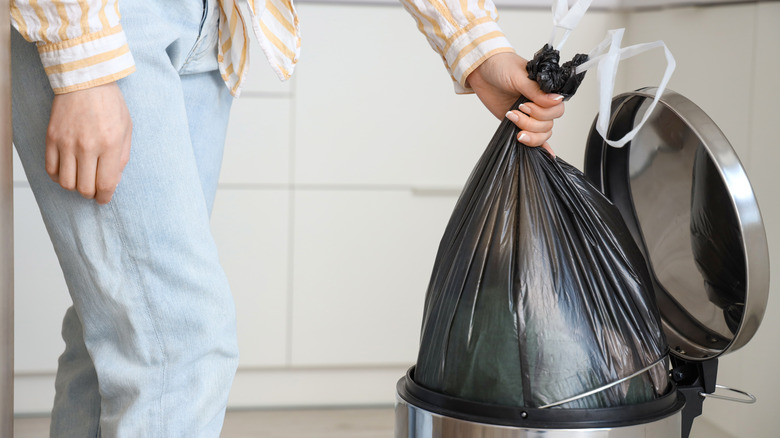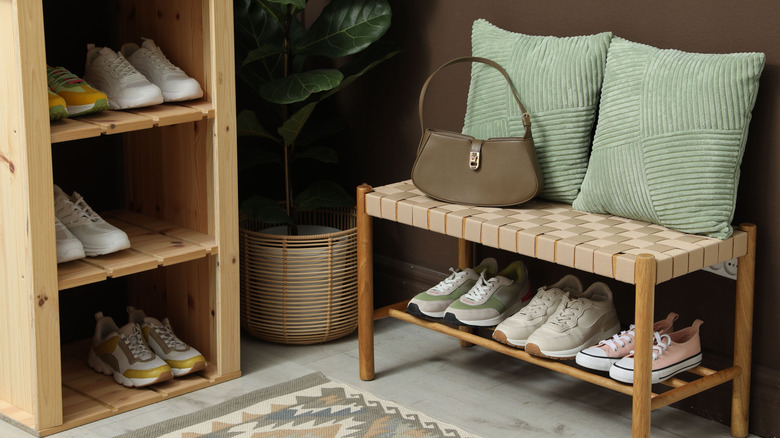11 Things To Do Every Week For A Cleaner, More Organized Home
We may receive a commission on purchases made from links.
Keeping your home clean and organized often feels like a losing battle. Despite your best efforts, you find yourself shifting through piles of clutter on the countertops, walking around a mound of laundry, or dealing with sticky floors until you reach your breaking point and wind up spending an entire weekend cleaning everything. Then, life happens. Before too long, you're back in that same spot wondering how everything got so out of control again.
If you want to break this frustrating cycle, one of the most important things you can do is develop a weekly routine — and stick to it. While some cleaning tasks can be stretched farther out (and some things should be cleaned daily), there are several tasks that you'll want to add to a weekly to-do list. Now, it's up to you to decide how these will best fit into your routine. If you have a very busy work schedule, you might want to dedicate a few hours on the weekend to tackle the majority of them. If you have some more flexibility and time, then spreading them out throughout the week may be more manageable for you. The important thing is to find a way to check these off every week if you want to avoid finding yourself with those mounds of laundry or clutter-covered surfaces in every room.
Declutter the counters every week
Have you noticed how quickly your kitchen countertops and island can go from clear and empty to full of clutter? They're just such a convenient place to put something down to "deal" with later. Whether you're piling up items to bring to the recycling bin, temporarily placing down the toiletries you picked up at the grocery store, or stashing the papers that came back from school with the kids, clutter piles up quickly.
Taking the time once a week to sort through everything that found its way onto your countertops can help prevent them from getting out of control. If you wait more than a week to conduct this task, then you're just asking for that pile to build and build. Over time, things may even become dusty or become lost. Set a routine to sort out items on a predetermined day of the week. Make piles for each room or level of your home to make the process more efficient. Then, you can bring one pile at a time to put things away. If you have a lot of items for each level, then investing in a few small bins or baskets, like the Owill plastic storage bins, could help you return things to their original home more easily. You might even consider leaving these bins out on the counter so you can sort things throughout the week, even if you don't have the time to put them back where they really belong.
Give the entire bathroom a good cleaning once every week
While some things in the bathroom should be cleaned daily, a weekly regimen is sufficient for some of the more routine tasks. Cleaning the toilet, for example, is a task that you should complete at least once each week. Keeping it germ-free will support the health of everyone in the home. Use a toilet brush and a toilet cleaner to scrub out the bowl if there are visible rings. Otherwise, you can focus your efforts on quickly wiping down the seat and exterior using a bleach wipe, such as a Clorox disinfecting wipe.
In addition to cleaning the toilet weekly, take a few minutes to scrub the inside of the shower or tub and wipe down the countertops and the mirror. Cleaning these surfaces will prevent bacteria and other grime from being able to build up. This buildup is not only unhealthy, but it will also make you have to work harder when you do decide to clean these surfaces. Finally, finish your weekly bathroom cleaning routine by taking out the trash and replacing the bath and hand towels. Changing towels weekly (or even more frequently) prevents dead skin cells and other germs from building up in the fibers.
Vacuum the floors at least once per week
Do you know how often you should be vacuuming the wood floors, carpets, and other surfaces in your home? This is another task to add to your weekly to-do list. Vacuuming weekly helps prevent dust, dirt, hair, and pet dander from building up over the flooring in your home. Plus, vacuuming at least once each week will also help protect these surfaces. The more that dirt and dust are allowed to build up over them, the more wear they can cause. Hard and sharp particles can actually scratch some hard floor surfaces, while dust and debris can get pushed deep into the fibers of a carpet when they aren't vacuumed up weekly.
Before setting your vacuuming routine in stone, it is important to note that a frequency of once per week is just a general guideline. See it as the minimum standard for cleaning these surfaces. Hardwood floors and carpeting, in particular, may need more frequent vacuuming depending on how much foot traffic they see and whether you have any kids or pets. If you do have animals, you should vacuum at least twice per week (or even three times for carpeted surfaces) to remove allergens from the floors and the air.
Changing your sheets once per week is important for comfort and health
Understanding how often to wash your bedsheets is crucial. And, despite what many believe and practice, this is another task that should make your weekly to-do list. Going too long between washings has the potential to negatively impact both your comfort and your overall health. The reason for this is that our bodies shed dead skin cells while we're sleeping. The longer you wait between washings, the more these will accumulate over the surface. Beyond how unpleasant sleeping in a heap on your own dead skin cells sounds, if you let them accumulate for too long, it can also attract mites who will feed on them while also irritating your skin.
Changing your sheets weekly during the summer is even more important. While you might be able to push things a bit during the cooler months, our bodies sweat more when the temperatures are higher. If you have allergies or asthma, then changing your sheets at least weekly might be even more important to you to help alleviate symptoms.
Give your pantry a quick clean and organizational check once per week
Do you hate it when your pantry turns into a disastrous mess? Nothing is on the right shelf. Bags of chips and other snacks are shoved wherever they'll fit. Boxes with pasta, crackers, and pancake mix are wedged into any open space. Sound familiar? Well, the best way to prevent this from happening is to add maintaining your pantry to your weekly checklist.
After taking the time to organize the pantry with labeled bins and containers, hooks, and over-the-door units, checking in on its status periodically can prove to be life-changing. Instead of having to empty everything each time, you'll only need to shift a few misplaced items back where they belong or clean up a few crumbs. One of the best times to complete this task is as you're making your grocery list. As you make sure that everything is where it belongs, you'll be easily able to take stock of what you have and what you are running low on.
Remove old food from the fridge once every week
Just as you don't need to thoroughly clean your pantry every week, it also isn't necessary to deep clean the fridge every week, either. However, some basic maintenance and care can go a long way towards maintaining order, cleanliness, and food safety in this heavily-used appliance. As with the pantry, taking a few minutes to return misplaced condiment bottles or jars of food to the spot they belong can go a long way towards preventing things from getting chaotic. However, there are other reasons you will want to check in on your fridge at least once per week. The fridge, obviously, holds perishable foods. Removing these items once they're no longer good can prevent accidental food poisoning if someone in the house accidentally consumes them. Even within the cooler conditions of a refrigerator, bacteria can grow on foods that have been sitting around for too long. Ideally, you should throw out or compost leftover foods within four days and most opened containers within a week.
As you're checking in on your fridge, you can add items to your grocery list that are running low. If you identify any items that aren't yet expired, but are approaching the date printed on the packaging, you could also move them to the front or work them into your meal plan for the following week.
Wash and put laundry away at least once every week to keep it under control
There may be several different ways to neatly fold your t-shirts, but what matters most is that you're taking the time to fold them — and the rest of your laundry — at least once per week. No one loves washing laundry. And even fewer of us love folding it or hanging it up to put it away. However, if you push this task off for too long, you'll be facing a major uphill battle. Laundry isn't exactly something that we can avoid. You need clean clothes to wear every day, and we already discussed the importance of washing linens and towels once per week. If you avoid it, you're going to find yourself digging through baskets of clean clothes looking for that pair of pants you want or, even worse, realizing that all of your pants are still dirty and sitting on the laundry room floor.
To avoid this, add laundry to your weekly schedule. Again, depending on your work schedule and how much time you have available during the week, you might decide to spread it out — washing towels on Mondays, linens on Wednesdays, and clothing over the weekend. If you don't have much time during the workweek, you might decide that a laundry marathon on Saturday or Sunday works best for your schedule. Just pick what works best for you and try to stick to the routine.
Dust surfaces once every week to keep them clean
We've all seen the movies or television shows where one of the characters dons a white glove and swipes their finger over a tabletop or mantle to show their utter disgust at the state of the house. How would you feel if one of these characters visited your home and checked on your dusting habits? If the thought of such a visitor makes you cringe, then that probably means you're not dusting frequently enough. In most situations, dusting should be done once per week to maintain your home's air quality and avoid irritating any allergy symptoms of household members.
There are a few considerations to keep in mind, however, that can help you determine the ideal frequency for completing this chore. While unused rooms may be able to go an extra week without being dusted, if outdoor pollution or pollen levels are high, you might need to dust even more frequently. It is also important to note that the ideal method for dusting can vary based on the item or surface type. For example, a microfiber duster, such as the OXO Good Grips microfiber delicate duster, is ideal for decorative pieces, while special cleaning wipes, like the EVEO electronic wipes, are best for televisions, computer screens, and other electronic devices.
Empty trash bins at least once every week
While you don't have to clean the garbage can itself every week, you should be emptying the bin at least once every seven days or so. Even if the bag isn't filled to the brim, those food scraps that you've thrown out are going to start to smell. Beyond the less-than-pleasant odors that will be released from the bin, the rotting food could even attract flies, mice, and other pests into your home. Beyond the annoyance that these bugs and rodents can create, they can also make more of a mess in the house or even threaten the health of those living inside it.
The most logical day to empty the kitchen trash bin is the day before your trash is picked up at the curb. Set a reminder on your phone or virtual assistant if you want to make sure you don't miss completing the task. While the cans in your bathrooms, office, or laundry room may not develop the odor that your kitchen trash has, it is still a good idea to empty these weekly, or at least every other week. Doing so will prevent them from starting to spill over and will help the whole room feel neater.
Stop mail from taking over by going through it at least once per week
While it can seem very daunting, tackling that pile of mail often is one of those quick and easy decluttering tasks you can complete in less than 10 minutes. That is, unless you let the mail pile up for weeks on end. Then, you could be looking at a real mountain that will take forever to sort through. Conversely, if you dedicate a few minutes to this job each week, the pile won't get the chance to turn into a small hill or a monstrous mountain.
Sit down with the week's mail in front of you and sort it into piles. These might include categories such as shred, recycle, bills to pay, important files, notices to file, and so on. After sorting, take the time to appropriately deal with each pile. Shred or recycle the junk mail, pay the bills, and file any papers that you want to keep. To prevent your mail pile from building up, you could consider sorting as it comes in through the week, then you'll only have to take a few minutes to make sure each pile is taken care of on your "mail" day. A mail sorter, such as the Gumihue mail holder, might help you categorize items as they come in. You could also look into signing up for electronic billing, when possible, or canceling your subscription to magazines you no longer read.
Give your entryway a once-over every week
Our entryways get put through a lot. When we walk in with our hands full, whatever we're holding often gets dumped on the table or console "temporarily." If we wear a different pair of shoes each day to match our outfits or the weather forecast, those get kicked off in a corner (or in the middle of the floor). Jackets, coats, umbrellas, packages, mail, and so many other things can also accumulate in this room at a rapid pace. For this reason, giving your entryway some T.L.C. every week is crucial.
There are several tips that can help you keep your entryway clean and organized, such as adding a small table, hanging a few hooks, or adding a tiered shoe rack. With these solutions in place, maintaining an organized space will be easier. And, worst case, it should take you less time on your designated day to return everything to where it belongs. As you're tidying up your entryway, don't forget that you'll also want to remove anything that doesn't belong there. For example, if you left some reusable grocery bags behind, bring them back to the car. If there is a package that hasn't been dealt with yet, open it, put the item away, and recycle the box.
